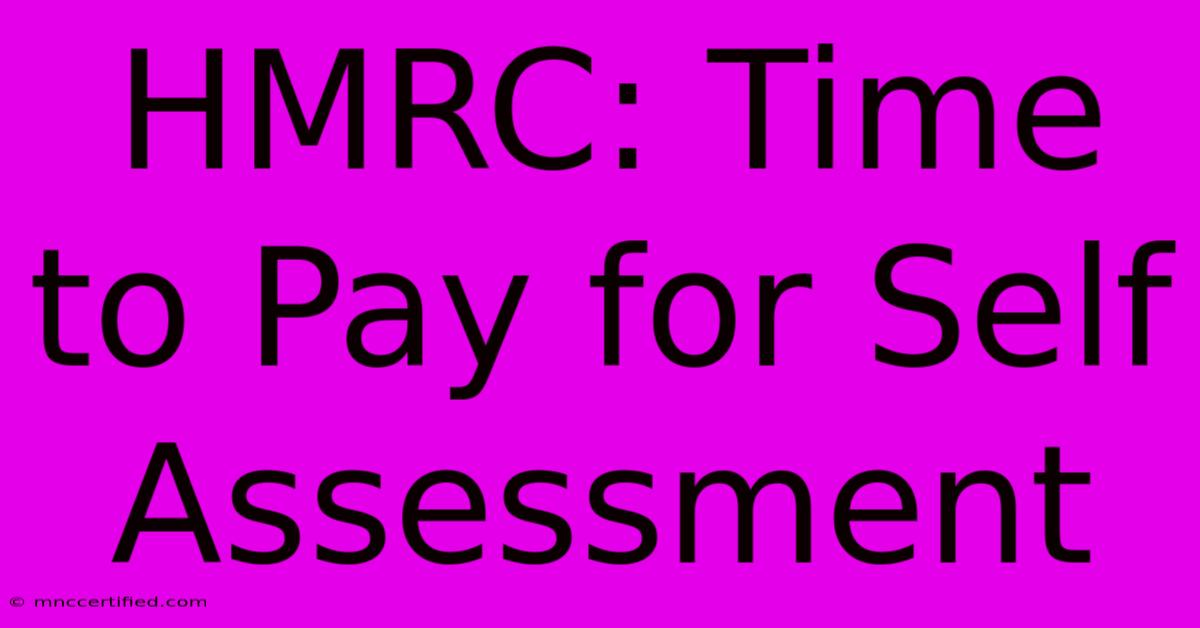HMRC: Time To Pay For Self Assessment

Table of Contents
HMRC: Time to Pay for Self Assessment – Avoiding Late Filing Penalties
Tax season is upon us, and for many self-employed individuals and business owners, the looming deadline for Self Assessment tax returns brings a familiar mix of anticipation and anxiety. What happens if you can't pay your Self Assessment tax bill on time? This article explores HMRC's Time to Pay arrangements, helping you understand how to navigate potential financial difficulties and avoid costly penalties.
Understanding the Self Assessment Deadline
The Self Assessment tax return deadline is typically January 31st each year. Failing to submit your return or pay your tax bill by this date can result in significant penalties. These penalties can quickly escalate, making timely action crucial.
What are the penalties for late Self Assessment?
HMRC imposes penalties for both late filing and late payment. These penalties can be substantial, accumulating over time and impacting your credit rating. Understanding these penalties is the first step in avoiding them. The penalties typically include:
- Late filing penalty: A penalty is charged if your Self Assessment tax return is submitted late. The penalty increases the longer you delay.
- Late payment penalty: A penalty is charged for each day your tax bill remains unpaid after the deadline. This also increases over time.
- Additional penalties: Further penalties may apply depending on the severity and nature of the late filing or payment.
HMRC's Time to Pay Arrangement: A Lifeline for Taxpayers
If you're facing financial difficulties and unable to meet your Self Assessment tax deadline, don't panic. HMRC offers a Time to Pay (TTP) arrangement, providing taxpayers with a structured plan to pay their tax debt over an agreed period. This arrangement gives you breathing room to manage your finances without incurring the harsh penalties associated with late payment.
How to apply for a Time to Pay arrangement:
Applying for a Time to Pay arrangement involves several steps:
- Contact HMRC promptly: Don't wait until the last minute. The sooner you contact HMRC, the better your chances of securing a favorable arrangement.
- Gather your financial information: Be prepared to provide details of your income, expenses, and outstanding debts. This will help HMRC assess your situation and determine a suitable payment plan.
- Explain your circumstances: Clearly and honestly explain your reasons for needing a Time to Pay arrangement. Providing supporting documentation, such as bank statements, can strengthen your application.
- Negotiate a payment plan: Work with HMRC to agree on a realistic and manageable payment plan that fits your budget.
- Stick to the agreed plan: Once you've agreed to a Time to Pay arrangement, it's crucial to adhere to the payment schedule. Failure to do so could result in further penalties and legal action.
What HMRC considers when assessing your application:
HMRC will carefully consider your individual circumstances when deciding whether to grant a Time to Pay arrangement. Factors they will assess include:
- The amount of tax owed: Larger debts may be harder to accommodate.
- Your income and expenses: HMRC will examine your ability to repay the debt.
- Your assets and liabilities: A complete financial picture helps determine your repayment capacity.
- Your credit history: Poor credit history might make it harder to secure a TTP.
- Your cooperation: Open communication and willingness to cooperate are crucial.
Alternatives to Time to Pay
While Time to Pay is a helpful solution, it’s not the only option. Depending on your circumstances, you might consider:
- Seeking professional advice: An accountant or financial advisor can provide guidance on managing your tax affairs and potential solutions.
- Applying for a hardship payment: In exceptional circumstances, you might be eligible for a hardship payment.
- Exploring government support schemes: Depending on your situation, you might qualify for other government assistance programs.
Preventing Future Tax Problems
Proactive financial planning can prevent future tax payment issues. Consider:
- Setting aside money regularly: Designate a portion of your income specifically for tax payments.
- Using tax-efficient strategies: Explore ways to minimize your tax liability legally and ethically.
- Maintaining accurate records: Keeping meticulous financial records ensures accurate tax returns.
Successfully navigating Self Assessment can be challenging, but by understanding the rules, planning ahead, and utilizing resources like HMRC's Time to Pay arrangement, you can avoid penalties and manage your tax obligations responsibly. Remember, proactive communication with HMRC is key. Don't hesitate to reach out if you anticipate difficulties meeting your tax obligations.

Thank you for visiting our website wich cover about HMRC: Time To Pay For Self Assessment. We hope the information provided has been useful to you. Feel free to contact us if you have any questions or need further assistance. See you next time and dont miss to bookmark.
Featured Posts
-
2024 Gchq Christmas Puzzle
Dec 12, 2024
-
Millwall Manager Harris Quits
Dec 12, 2024
-
Paltrow And Swifts Take Gomez Benny
Dec 12, 2024
-
Fatal Ormskirk Crash Building Impact
Dec 12, 2024
-
Watch Rangers Vs Tottenham Europa League
Dec 12, 2024